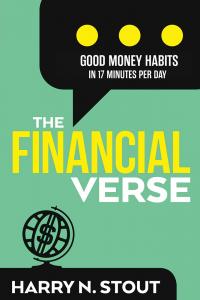Making Employer 401(k) Contributions Mandatory - The Time Has Come
Making Employer 401(k) Contributions Mandatory - The Time Has Come
Americans need greater retirement savings to fund a secure retirement. It is time companies are mandated to help fund this important financial need.”
VERO BEACH, FLORIDA, UNITED STATES, March 22, 2022 /EINPresswire.com/ -- The time has finally come for employers to make mandatory contributions to 401(k)s, and other defined contribution plans according to FinancialVerse podcast host Harry N. Stout. Americans working both full and part-time need to have larger amounts of retirement savings to generate the incomes they will need when full-time work stops. Stout says existing savings levels are just not enough. Recent increases to basic living expenses due to the impact of the pandemic and inflation are exacerbating the retirement savings gap.— Harry N. Stout
Understanding Retirement Outcomes
Stout says, as a country, we have effectively eliminated defined benefit pension plans. According to recent reports the percentage of workers in the private sector whose only retirement account is a defined benefit pension plan is now 4%, down from 60% in the early 1980s. About 14% of companies offer a combination of both types of plans.
At the same time, one of the largest plan administrators recently reported that the average 401(k) balance reached a record $130,700 in the fourth quarter 2021. While this is a wonderful result, this amount will not provide enough supplemental retirement income to maintain employee lifestyles when they stop working after considering increased living costs and projected life expectancies of 20 to 30 years.
Lastly, on a global basis the United States’ existing retirement laws, regulations and structures are producing outcomes that rank well down the major country rankings.
Realizing that change is needed, our legislators at the federal and state level continue to look for ways to reform our defined contribution-focused retirement system and increase projected future savings by expanding access to retirement plans and allowing lifetime income products to be part of plans. While these efforts are laudable, they do not go far enough. The proposed changes will not translate into accumulating the amount of needed assets to generate satisfactory retirement outcomes for households. We will likely fall short as increasing access or adding income options does not necessarily equate to actually having cash in retirement accounts when full-time work ends. What is needed is to mandate having defined contribution plans in place for all workers – both part-time and full-time – and requiring minimum corporate retirement contributions. At the same time there needs to be an effort to encourage American business to making satisfactory retirement outcomes a key part of compensation planning.
Today’s Environment
Stout offers his observations on today’s environment:
>Over the last several decades through legislation and regulation we have moved the responsibility for retirement saving from corporations to individuals. We have put households, already dealing with the high costs of living including energy, healthcare, education and housing, in charge of saving enough to provide future incomes that will allow them to have reasonable lifestyles in later life. At the same time wages have not increased sufficiently to compensate for the increase in living costs. The result of this squeeze is that households have not been able to accumulate sufficient savings and benefits to secure their non-working years.
>Due to low levels of savings and resources, more and more Americans will likely depend on Social Security retirement benefits as their primary income source to pay living expenses when full-time work stops. As we know, Social Security was only designed to replace about 40% of the average worker’s compensation prior to retiring. Relying on Social Security as the primary income source will not result in satisfactory lifestyles in retirement.
>The financial status of Social Security needs reform to be sustainable for current and future beneficiaries. This effort will likely put additional pressure on the federal government and workers to contribute more.
>As we have demonstrated in the past few decades, mandating defined benefit plans for all workers is not feasible from a financial and accounting standpoint for businesses.
>Post pandemic, we have seen that American business needs qualified workers. Recruiting and retaining qualified workers is essential for business success today and in the future. Enhanced retirement savings offerings could lead to attracting the needed workers.
The Time Has Come
Stout believes that since we already have a full defined contribution infrastructure in place, we should find a way to better utilize it. It has all the major regulations, years of business use and worker familiarity that come from a program in place since 1978. An efficient way to accomplish this would be to mandate that all employers have defined contribution plans in place and contribute a minimum amount towards each (full and part-time) employee’s retirement. We could mandate a minimum contribution level and allow for matching of employee contributions above this amount. We could also mandate the vesting methodology for these contributions. This new effort could be subject to the contribution maximums already in place.
Stout emphasizes on his podcast that a future retirement crisis is building, and more aggressive actions are needed to help Americans enjoy a safe and secure retirement. He believes mandating employer retirement contributions should significantly increase accumulated assets and, ultimately, retiree incomes.
Harry N. Stout is a podcast host, published author and former senior executive for several of the nation's largest life insurance and annuity companies. A certified public accountant by training, he has industry experience in the U.S. and abroad. He is acknowledged as a national personal finance thought leader and has written for numerous financial publications and participated in national media of all types.
He is a past director of the Life Insurance Marketing and Research Association (LIMRA), the National Association for Fixed Annuities (NAFA), the Financial Services Council of Australia and the Insurance Marketplace Standards Association.
Harry N Stout
The FinancialVerse Organization
+1 843-460-3218
email us here
Managing Your Money in Uncertain Times


